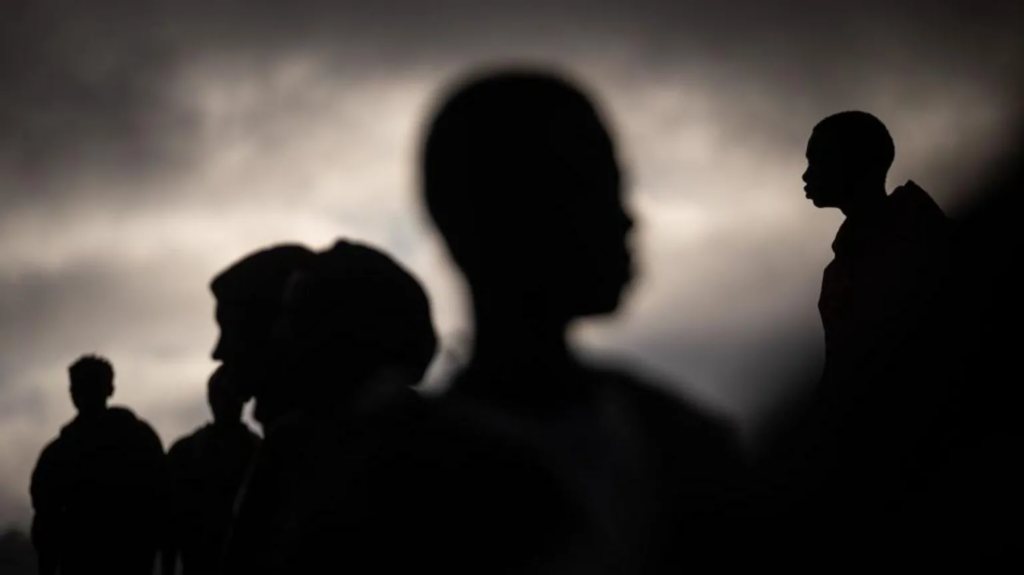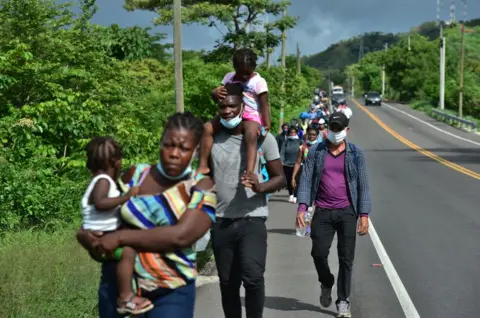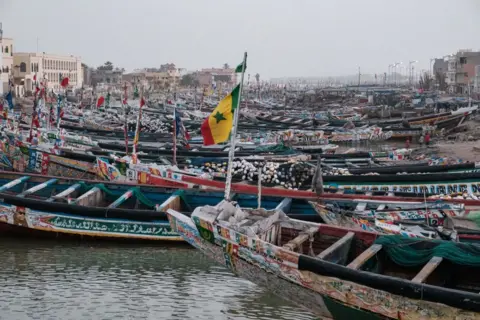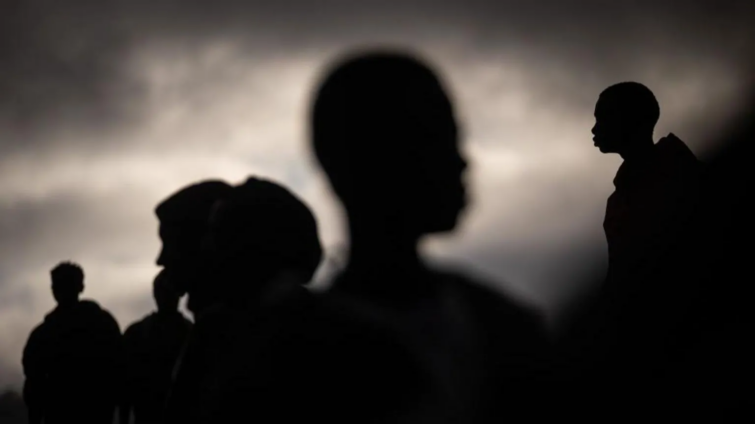As record numbers of young Africans risk their lives trying to reach the Canary Islands, Spain’s prime minister begins crisis talks with Senegal, Mauritania and The Gambia to tackle migration.
But this will come as little comfort to Amina.
“I found out that my son had died on social media,” she tells the BBC from her home near Senegal’s capital.
“We used to talk all the time and he told me he wanted to go to Morocco,” the 50-year-old says.
“He never mentioned he was planning to take a boat.”
She last heard from her son, Yankhoba, in January. A soul-crushing, six-month search for the devoted 33-year-old tailor proved fruitless.
Then, in early August, fishermen discovered his body on the other side of the Atlantic Ocean, about 18km (11 miles) off the coast of the Dominican Republic.
At least 14 decomposing bodies were on that small, wooden boat, say local police. Mobile phones and personal documents found alongside them indicated that most were from Senegal, Mauritania and Mali.
Among the items on board was Yankhoba’s identity card.
Dominican authorities also reported the presence of 12 packages containing drugs.
Analysis is being carried out to determine the time and cause of the deaths, although it is presumed that the passengers had been trying to reach the Canary Islands and had got lost. Their boat was typical of the wooden fishing boats often used to transport illegal migrants from West Africa towards Europe.
Yankhoba was his mother’s first child and only son. It is a position which comes with a great deal of responsibility in Senegalese society.
The young tailor is survived by his wife and two young children, including one he did not live long enough to see.
Before Amina learnt of her son's death, she appealed for help from missing person pages on Facebook and asked social media influencers with big followings to highlight his case.
“I held onto the belief that Yankhoba might have been held in a prison somewhere in Morocco or maybe even in Tunisia,” she says, her voice breaking.
Young West African migrants trying to reach Europe are increasingly choosing the Canary Islands route over the Mediterranean alternative.
Despite the dangers, it involves just one step, rather than needing to cross both the Sahara Desert and the Mediterranean.
Last year alone the Atlantic route saw a 161% increase compared to the previous year, says the European Union border agency, Frontex.
Spain is one of the European countries that receives the most migrants.
As for the people leaving Senegal, a growing number of them are middle-class workers able to afford the more expensive journey to the US instead of Europe.

That is what Fallou did.
Despite running a successful sheep and bird farm in Dakar for almost a decade, he was struggling.
“I felt stuck. On top of running my business, I was also working in a factory, but I struggled to make ends meet,” he recalls.
So at the age of 30, he sold everything he owned and bought a one-way plane ticket to Nicaragua in Central America. From there, he would attempt the overland journey to the US.
Fallou was encouraged to leave by his older brother, already based in the US, and by countless pictures and videos of Senegalese people on TikTok sharing their trek through Central America.
“My mother didn’t want me to go, but I was ready to face death,” he says.
Fallou travelled for 16 days, passing through Nicaragua, Honduras, Guatemala and Mexico, with the help of smugglers. In total he spent more than $10,000 (£7,600) on the journey.
By contrast, poorer migrants who take the boat from Senegal to the Canary Islands typically pay smugglers around $450.

Fallou says that his sacrifice came with its share of horrors.
“Several people died before my eyes,” he says.
“But I saw some women who kept going, even with their children on their backs, and I thought: 'I have to stay strong.'”
After being held in a US detention camp for a few days, Fallou was eventually given leave to remain as an asylum seeker. He has since been reunited with his brother and now works as a mechanic.
Fallou was lucky, but many African migrants to the US are not.
Last September, more than 140 Senegalese people were deported back home after crossing the Mexico-US border.
Human rights groups and diaspora communities who support the new arrivals report that shelters are often overwhelmed with such cases.
Some migrants have no option but to sleep on the street. Others may be allowed to stay temporarily in mosques.
Despite West Africans’ growing interest in alternative migration routes, it is still the case that most African migrants attempt to reach Europe via the Mediterranean Sea.
Over the last decade, the UN’s migration body (IOM) says more than 28,000 migrants have drowned in that one body of water alone.
Political promises
“People are leaving [West Africa] because they are faced with an explosive cocktail of security, institutional, nutritional, sanitary, post-Covid and environmental problems,” says immigration expert Aly Tandian.
The number of people leaving Senegal in particular is rising, despite being a relatively peaceful country with a new president who is promising to create jobs for young people.
Since the new government was elected in March, it has succeeded in reducing the price of some basic necessities, including oil, bread and rice - therefore easing the cost-of-living squeeze.
But it is not enough.
“We all thought that the hope raised by the change of regime would halt the resurgence of these migratory flows, but unfortunately this has not been the case,” says Boubacar Sèye, head of the non-government organisation, Horizon Without Borders.
“Despair and doubt have permeated our sociological environment, to the point where people no longer believe that their destiny can be fulfilled here,” he adds.

Mr Sèye has written a formal letter to the Senegalese authorities, pleading for an investigation into what happened to the boat found off the Dominican Republic.
He says reports show “there is a criminal economy surrounding these irregular migrations. Trafficking in drugs, arms, human beings and also organs”.
In July, after 89 bodies were found in a boat off the Mauritanian coast, Senegal's Prime Minister Ousmane Sonko made a public plea to young people not to take the perilous Atlantic route to Europe.
“The future of the world lies in Africa, and you, young people need to be aware of that,” he said.
Yet, for the large number of young Africans still risking their lives to reach Europe and the US, that future is anywhere but at home.
Latest Stories
-
GNAT demands overhaul of teacher promotion system, housing support, and study leave reform
6 minutes -
‘A historic moment’ – Faith Ladies coach Raymond Fenny celebrates first-ever FA Cup triumph
7 minutes -
Carragher blames Kudus’ dip in form for West Ham’s poor season
14 minutes -
Lyrical Joe expresses disappointment in losing out on TGMA Rap Performance award
16 minutes -
Kenya’s ex-justice minister ‘deported’ from Tanzania
18 minutes -
Kumasi decongestion has failed due to previous approach – Mayor
18 minutes -
ECG collaborates with NADMO to safely restore power after Accra Floods
30 minutes -
3 confirmed dead in Adentan flood, MCE blames construction on waterways
1 hour -
We are not in crisis – Jinapor fires back
1 hour -
Lawrence Agyekum scores as Cercle Brugge thrash Patro Eisden
2 hours -
John Jinapor rejects ‘fear tactics’ allegations, outlines strategies amidst Ghana’s energy challenges
2 hours -
I’m fixing the energy sector, not complaining – John Jinapor fires back at critics
2 hours -
Diasporans to get insured as Old Mutual and GUBA strike strategic partnership
2 hours -
Ga Traditional Council summons 15 churches for flouting ban on noise-making
2 hours -
Burkina Faso immortalizes Rawlings as son Kimathi rallies Africa for unity
2 hours

